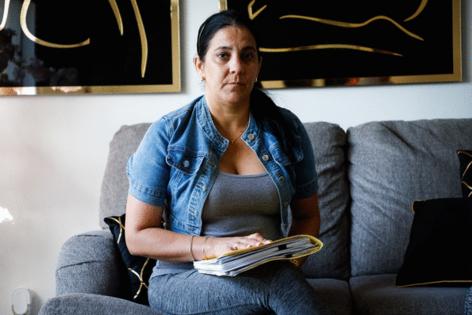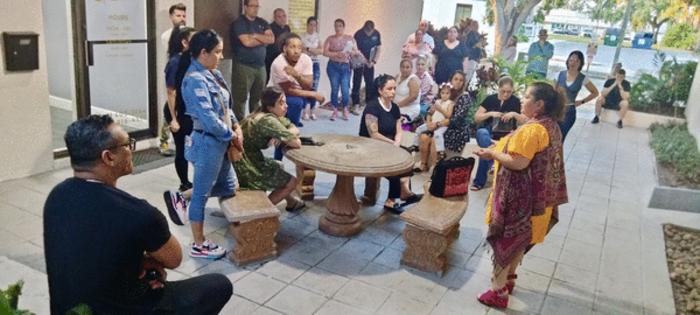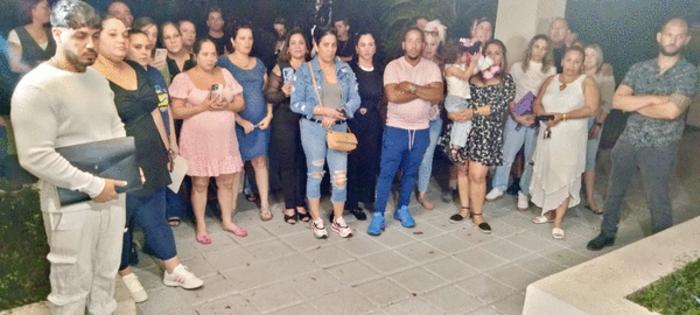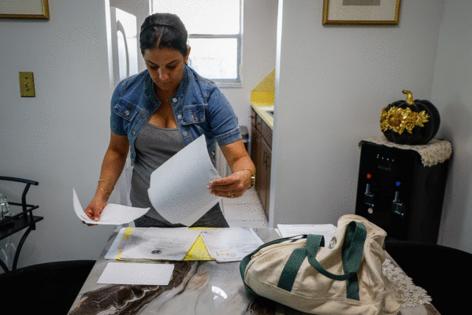Tampa woman posed as immigration lawyer, clients say, leaving dozens in limbo
Published in News & Features
TAMPA, Fla. — Yordanka Rumayor said she paid $18,000 to an immigration service in Tampa that promised temporary permits or humanitarian parole and legal representation for her family. But the paperwork, she said, was never filed.
María Victoria Abio La Rosa said she paid the same service $15,000 for applications for herself, her husband and her son. After months of believing their legal struggles were over, she was told by U.S. Citizenship and Immigration Services that her family remains in limbo.
The two Cubans, who crossed the southern border with their families in recent years, are among a long list of immigrants who said they trusted Dayana Barreto García and her Tampa firm, García SM Immigration Service, to help them secure documents and visas.
Barreto García, 43, who also operated businesses under the name Dayana García, offered a range of immigration services, including handling legal paperwork for work permits and green cards.
She promoted herself on social media platforms with photos, videos, and flyers. She sponsored local music events for the Cuban community and job fairs in Tampa Bay. People called her “licenciada” or “doctora,” titles that in many Latin American countries imply she was a lawyer.
But according to the Florida Bar, she was not.
A dozen former clients described incidents to the Tampa Bay Times in which Barreto García misrepresented her qualifications, filed incorrect paperwork, or assured them their cases were active when they apparently weren’t. Combined, they said they paid her more than $140,000 or services that they claim were not rendered.
“She spoke with confidence and was convincing,” said former client Dariel López, 34.
Barreto García’s alleged practices, which have ensnared dozens of mostly Cuban immigrants from around Florida, were reported last year to the fraud unit within U.S. Citizenship and Immigration Services, according to a lawyer representing six alleged victims. A spokesperson for the agency, citing federal policy, declined to confirm the existence of an investigation.
The Florida Bar confirmed that it is investigating whether García has practiced law without a license, according to a spokesperson for the organization.
Phone numbers listed for Barreto García’s office were no longer in service when the Times tried calling in late September and early October. She did not respond to multiple email requests for comment, and no one answered the door at a Tampa home where she is listed as the owner. No one has answered the door on recent visits to her Tampa office, which appears closed but still displays the company logo. Other tenants said they saw activity there until late July.
López found Barreto García‘s office locked and empty when he tried to reach her in late September. He said he hired her more than three years ago after hearing from friends who got work permits through her office. She introduced herself as a “licenciada,” he said, and promised to represent him before immigration judges.
He said he paid about $13,000 for himself and his wife, Marilet Monzón Moreno, 28, thinking they would get a green card and legal representation in court. But their case went nowhere.
“She was playing with people’s immigration status, which is the most important thing,” López said. “The money we paid was earned with a lot of sacrifice. I don’t know how she could do this to her own people.”
López posted a video on TikTok and Instagram to warn others. That sparked dozens of similar stories in Tampa, Miami, and other cities where Cuban immigrants and their families said they were exposed to the same pattern by Barreto García.
Three former clients told the Times they have immigration hearings this fall and don’t know what they can do. Others said they spent their savings and cannot afford an immigration attorney. Many no longer have valid work permits and cannot renew their driver’s licenses.
“How will we survive? What will happen to us?” said Austeniel Fleites González, 47, a Cuban handyman who said he paid Barreto García $7,000 for legal representation in court and a permanent resident card.
His sister, Arisleibys Iriarte, 42, said she lost paid García $20,000 over the past two years on humanitarian parole applications, and other filings for herself, her husband and two children.
Iriarte is part of a WhatsApp group with 155 alleged victims sharing daily stories, questions and advice. For many, the details of their cases ring familiar.
When clients had immigration hearings, they said Barreto García told them the sessions were virtual. She called them to her Tampa office and had them wait in another room. She said she would handle everything by video call and told them not to appear before the judge. In some cases, clients said, she left them waiting for hours before telling them hearings were postponed or resolved in their favor.
Abigdail Torres, 33, and his girlfriend paid $8,000 for work permits and legal representation but didn’t receive permits and face deportation. Torres said Barreto García convinced him his court hearing would be handled virtually from her office. She eventually told him she had persuaded the judge to postpone it. Weeks later, after checking with Citizenship and Immigration Services, he learned this was false.
Torres doesn’t have permanent legal status and he’s unable to find an attorney to take his case, he said. His girlfriend has a hearing scheduled for March in Orlando.
“We are desperate,” said Torres.
Community advocate Ana Lamb said the case mirrors other situations that exploit immigrants, such as one run by Elvis Harold Reyes of Brandon. Reyes posed as a pastor and immigration lawyer and defrauded more than 200 people. In 2021, he was sentenced to 20 years in prison.
To prevent migrants from being misled and manipulated, a Florida law, HB 915, banned notaries and people like Barreto García from using terms like “immigration consultant” or making false claims about legal expertise. It took effect July 1.
One of the law’s sponsors, Democratic Rep. Johanna López, said too often families place their trust in people who prey on their vulnerability.
“This law requires transparency in immigration and legal service advertisements and ensures that our community knows who is, and who is not, authorized to represent them,” López said.
But getting justice is not easy or immediate. The Hillsborough County Sheriff’s Office has received three reports on this case, spokesperson Carolina Montelongo said. All three were forwarded to the U.S. Citizenship and Immigration Services.
Tampa immigration attorney Lisette Sanchez said she reported Barreto García last year to a unit inside Citizenship and Immigration Services that investigates immigration fraud. The unit, known as the Fraud Detection and National Security Directorate, interviewed six of her clients, most recently a year ago. Sanchez said her last contact with them regarding this investigation came in July.
Rumayor, the Cuban immigrant who paid $18,000 for green cards and legal representation, said Barreto García seemed credible, with diplomas on the walls, photos of U.S. presidents and assistants who appeared friendly and helpful.
“I thought she was a lawyer,” said Rumayor, 44. “You want to believe it because when you arrive in this country, you don’t know anything about the system.”
Abio La Rosa, 52, had the same impression. Her son, who has Asperger’s syndrome, was a minor when the process began two years ago. He used $1,700 from his own savings to pay for his filings.
Abio La Rosa grew suspicious when Barreto García evaded questions about her son’s immigration case. One day, she decided to call U.S. Citizenship and Immigration Services and learned that nothing had been filed.
“It was horrible,” she said. “How could you do this?”
©2025 Tampa Bay Times. Visit at tampabay.com. Distributed by Tribune Content Agency, LLC.














Comments